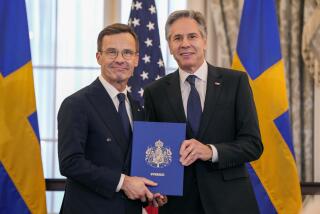Smiles, Champagne Hail Success at Security Talks
- Share via
STOCKHOLM — Delegates to the Conference on Security and Confidence-Building Measures in Europe that began 33 months ago formally ended their talks Monday on a note of restrained self-congratulations for creating the first new East-West arms accord in seven years.
After a round of brief speeches at a final plenary session, the chief U.S. and Soviet negotiators, Robert L. Barry and Oleg A. Grinevsky, clinked glasses of champagne, smiled and shook hands for photographers. They exchanged pleasantries in Russian and English several dozen times.
The Stockholm agreement concluded Sunday night provides--for the first time in history--for mandatory advance notification of all major military maneuvers in Europe, their observation in many cases by military staff officers from all the countries adhering to the 1975 Helsinki Accords and automatic mandatory aerial inspections of suspicious military activities that have not been announced. Tiny, isolationist Albania is the only European country not involved in the agreement.
“We have much to learn about confidence-building, and the measures adopted here will provide a test case as we consider how best to proceed in the future,” Barry said at Monday’s final plenary meeting of the 35-nation conference.
“Because of our general concerns about compliance with international commitments, my government will follow the implementation of the Stockholm regime with particular attention. Stockholm is a beginning,” he added.
Grinevsky was more upbeat in his final remarks and almost jubilant in chatting with reporters afterward. He has an excellent command of English, a quick and lively manner and a good sense of humor, and all were at work in his last appearance here.
When the conference began, in January, 1984, Yuri V. Andropov was nearing the end of his brief reign as Soviet leader, to be followed by Konstantin U. Chernenko. But Grinevsky remarked candidly that “this result in Stockholm would never have happened without the new Soviet leadership” of Mikhail S. Gorbachev. It was, he said, a success of “realism and common sense.”
Many of the delegation chiefs in Stockholm will be traveling almost immediately to Vienna, where preparatory work is to begin today for the third review conference on the Helsinki Accords, scheduled to open Nov. 4. At the Vienna meeting, likely to last up to two years, the 35 Helsinki states will again be looking at one another’s performance on human rights, cultural and economic cooperation, and will be discussing how the new Stockholm agreement is being implemented after it goes into effect Jan. 1.
In Vienna, there will also be months of discussion about an agenda for a European disarmament conference, the next phase of the successful conference here on security and confidence-building.
“It will be the task of the Vienna meeting to draw conclusions about the future, but the United States will continue to be among those demanding balanced progress in all areas,” Barry told the final session.
“It seems to us self-evident that an agreed understanding of what forces are routinely stationed in Europe, with what combat capability, is a fundamental requirement of any serious effort to reduce the level or strength of those same forces through a disarmament agreement.”
More to Read
Sign up for Essential California
The most important California stories and recommendations in your inbox every morning.
You may occasionally receive promotional content from the Los Angeles Times.













